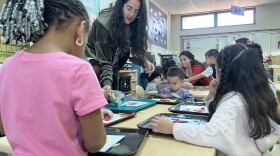Tom Fudge : One of my favorite stories about Albert Einstein tells of how he was once speaking to a group of people about politics. Someone in the crowd said to him... if you're so smart why don't you become President of the United States? According to the story, Einstein laughed and said, "Politics is a lot more difficult than science!"
That fact, if you call it a fact, is seen in many aspects of our lives in the scientific age. We can create nuclear weapons. But are we smart enough to prevent our use of them from destroying mankind? We can create genetic engineering. But can we manage it, so it will not upset the delicate balance of nature that's so crucial to life on earth? Those are cultural, political and ethical questions. And they are central to our philosophy of scientific progress.
The Ethics Center's forum "Retrospective: Science and Ethics News Stories of 2008" is Wednesday, December 3, 2008, at 5:30 at the Reuben H. Fleet Science Center in Balboa Park. The event is free and open to the public.
Guests
- Michael Kalichman , neuroscientist at UCSD and founder and co-director of the Center for Ethics in Science and Technology.
- Kenny Goldberg , KPBS News health reporter.
- Terri Somers , biotechnology reporter for the San Diego Union-Tribune.




